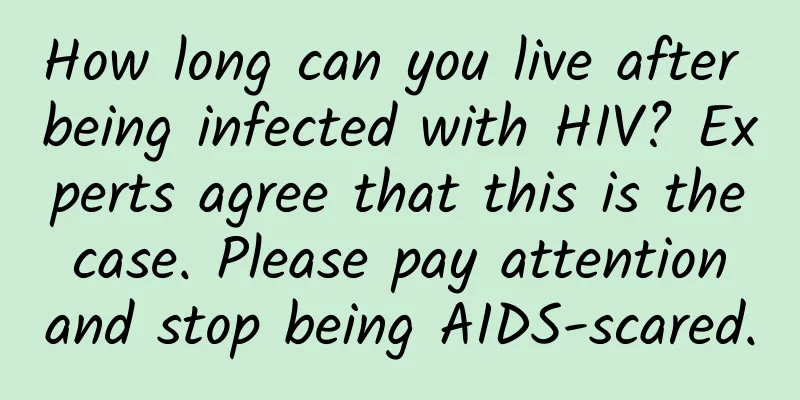How long can you live after being infected with HIV? Experts agree that this is the case. Please pay attention and stop being AIDS-scared.

|
On June 5, 1981, AIDS was first reported in the United States. At that time, no one would have thought that AIDS would have such a profound impact on humanity. In the few years after the discovery of AIDS, many scientific studies were not in-depth, and there were no relevant treatment drugs and methods. Many infected people died within a few years after the infection was discovered, so people equated AIDS with a terminal illness. Now, many people infected with HIV are still concerned about how long they can live after being infected with HIV. Let's discuss it together, hoping that everyone will not be "fearful of AIDS". If you are unfortunately infected with HIV, you must face it correctly. What is AIDS? AIDS is the English translation of Acquired Immunodeficiency Syndrome (AIDS). Its pathogen is human immunodeficiency virus (HIV), also known as the AIDS virus. After a person is infected with HIV, the virus mainly attacks the body's immune system, resulting in progressive damage to the immune system and a gradual decline in immunity, which ultimately leads to loss of immunity and susceptibility to infection, such as by bacteria, viruses, fungi, protozoa, etc. Everyone is susceptible to HIV, and there is currently no vaccine to prevent HIV. Transmission routes of AIDS AIDS is a serious and fatal infectious disease. There are three transmission routes: sexual transmission, blood transmission and mother-to-child transmission. 1. Sexual transmission In 2021, about 96% of newly discovered HIV infections in China were transmitted through sexual contact. Sexual transmission includes transmission through men who have sex with men (MSM) and transmission through heterosexual sex between men and women. As people's sexual concepts and sexual orientations become more open, this proportion is still rising. 2. Blood transmission Before 2005, the main routes of HIV/AIDS transmission in China were drug use through shared syringes and selling blood or blood components. In recent years, the country has vigorously cracked down on drug use and trafficking, and implemented the "needle exchange" policy. The transmission of HIV/AIDS through blood is now rare and is showing a downward trend. 3. Mother-to-child transmission If women infected with HIV do not receive intervention treatment, they may transmit HIV to their fetuses during pregnancy, childbirth, and breastfeeding. In the past, mother-to-child transmission was more common. Now, the country has introduced relevant laws and regulations to reduce the rate of mother-to-child transmission of HIV. With the implementation of relevant policies, the proportion of mother-to-child transmission of HIV is decreasing. In addition to the above three transmission routes, AIDS cannot be transmitted through mosquito bites, dining together, hugging, working together, and polite kissing. Treatment of AIDS When AIDS was first discovered, there were no drugs or methods to treat it. In 1987, scientists discovered that the anti-tumor drug zidovudine (AZT) had an inhibitory effect on HIV, so zidovudine was used to treat AIDS. Later, more and more drugs came out, and there were more and more drugs and methods to treat AIDS. In 1996, Chinese-American scientist David Ho proposed the famous "cocktail" therapy. Since then, AIDS is no longer a terminal illness. As long as it is treated well, the life expectancy of HIV-infected people can be greatly extended. In 2016, at the World AIDS Conference held by the United Nations AIDS Program (UNAIDS), many experts and scholars reached a consensus: after being infected with HIV, as long as it is well treated, it can be considered that AIDS will no longer affect the life expectancy of the infected person. In other words, after being infected with HIV, as long as it is well treated, the life expectancy of the infected person is almost the same as that of the uninfected person. At the end of 2016, our country proposed a "detection and treatment" plan for the treatment of AIDS, which can greatly improve the treatment effect for infected people. Prevention of AIDS Although AIDS cannot be completely cured, it is completely preventable. First of all, when engaging in sexual intercourse (whether it is homosexual intercourse between men or heterosexual intercourse between men and women), condoms must be used throughout the process, correctly, and every time. Second, don’t take drugs in any way. Again, if women infected with HIV want to have children, please do so under the guidance of professionals. To sum up: If you are unfortunately infected with HIV, with regular treatment and physical examinations, AIDS will no longer affect the life expectancy of the infected person. I hope everyone will no longer panic about HIV infection. |
<<: 【World Health Day】Active exercise + healthy diet - the basis of a happy life
>>: National Nose Care Day | Does sneezing, runny nose, and nasal congestion mean you have a cold?
Recommend
Dull abdominal pain before menstruation
Many women will experience premenstrual lower abd...
44-year-old suddenly stopped menstruating
Menstruation is a normal physiological manifestat...
Three essential tips for women’s health!
Maintaining good health and youthful beauty is th...
I had a bloated lower abdomen and wanted to defecate a week before my period.
The female body usually discharges two substances...
Year-end physical examination, @diabetics: don’t forget these 3 screenings
In November this year, the top medical journal Th...
What are the taboos during confinement?
During the confinement period, women do need to b...
How to do ani-lifting exercise for women
We often say that we should persist in regular ex...
Counterpoint: The average capacity of NAND flash memory built into mainstream smartphones will exceed 100GB in 2020
NAND flash capacity has become one of the most im...
Why are there so many deformities in artificial insemination?
Pregnancy is becoming more and more difficult for...
7 months pregnant and no weight gain
After pregnancy, the baby in the belly is gradual...
Ectopic pregnancy B-ultrasound diagnosis picture
Every woman hopes that her pregnancy process will...
Pregnant women want to eat meat. Which kind of meat is good?
After experiencing nausea and vomiting in the fir...
Is 5mm breast duct dilation serious?
We need to understand clearly the situation of ma...
What to do if the vaginal wall bulges during pregnancy
You may not have heard of vaginal wall prolapse, ...









